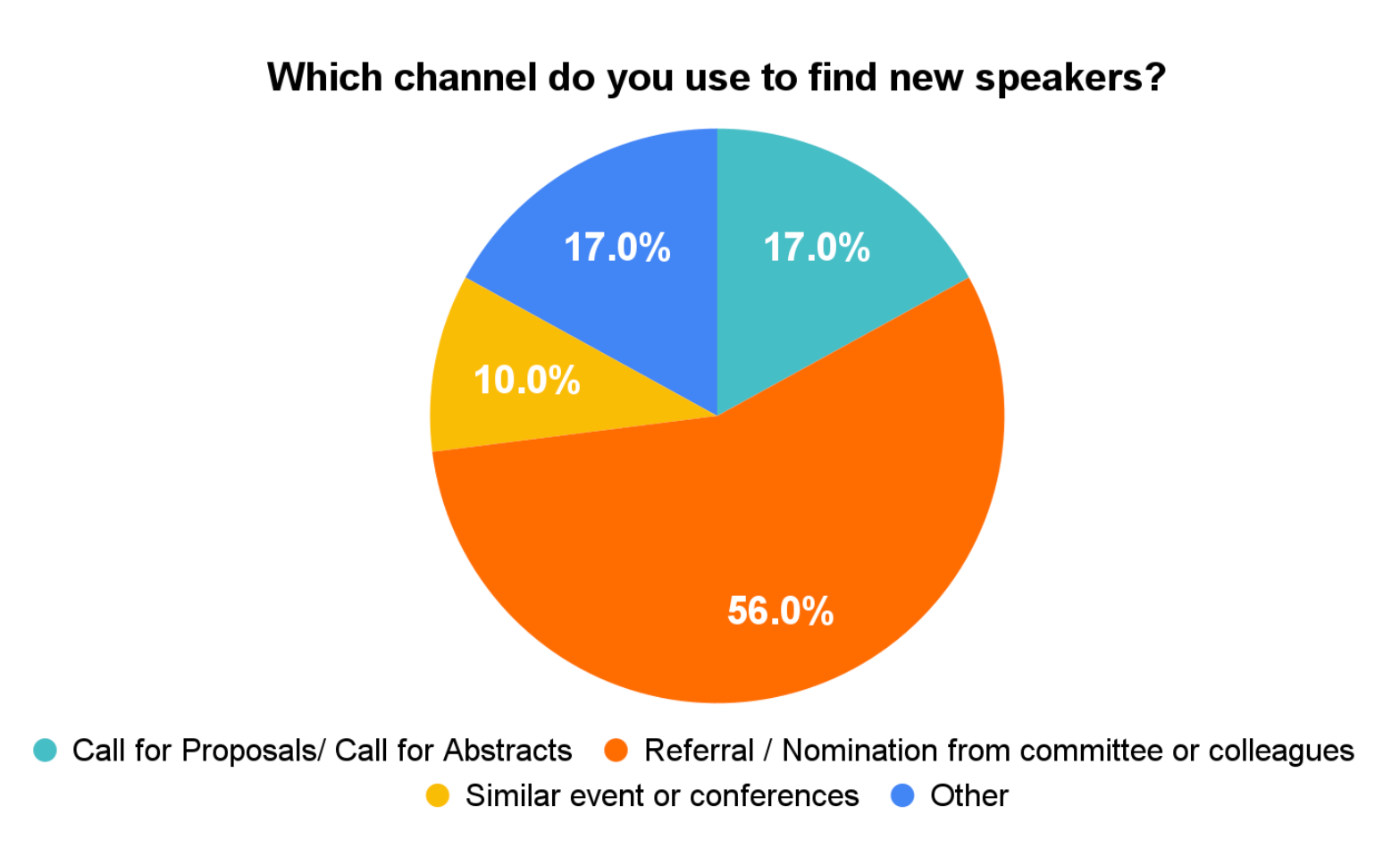As an event organizer, you know the true price of safe-choice speakers: dramatic Dr. Seuss quotes and in-person-zoom-fatigue. Fortunately for you, there are no real rules for your speaker lineup. In fact, stronger events often break the status quo, and positive change is actually better for your attendees than matching someone else’s ideals.
To learn about finding your event speakers, Whova interviewed Jessica Rizza and Gayle Mitchell, two long-time event organizers who hire by topic, not by name. When they want to “wow” their audiences, they don’t follow a standard – they look for niche experts with the best, thought provoking content.
For Jessica Rizza and Gayle Mitchell, underground speakers bring surprising perspectives, and this gives attendees more to remember after an event. At the same time, branching out allows rising speakers to build experience and jumpstart their careers. In this way, both ends of the panel benefit from finding new voices. If you want to start conversations, don’t compete for the same, overbooked speaker as everyone else. Instead, make your conference your own with Whova’s 10 tips for brand new, professional speakers.
“When we have so many speakers, our attendees just wait for that agenda to come out to see what the sessions are and who the speakers are prior to attending, and we definitely see an increase in attendance once we release that agenda. And we actually highlight our speakers… in Whova to promote people attending our event.”
– Development Coordinator Jessica Rizza
Searching for Speakers
The next five tips offer new methods and spaces for finding new speakers. Both Jessica and Gayle have practiced these themselves, and, whether you prefer searching your own contacts or starting out online, start here to expand your outreach strategies.
1. Ask your audience!
Your audience is your target audience, so why not ask for their speaker preferences? Gayle Mitchell suggests that, instead of anticipating audience needs, you let your attendees show you what’s popular. Surveying your audience saves you the guesswork of predicting popularity and instead points you to the most clear cut, attendee-sourced solution. Whova offers customizable event survey questions, so, if you want attendee opinions now, you can instantly send them a notification.
“So my plan going forward for this year is to take the list of the topics people were interested in and the speakers that were recommended and let them have first crack and let them cherry pick what they may be interested in.”
– Coordinator Gayle Mitchell
2. Scout Referrals Close to Home
In your speaker search, you want to catch someone who is doing the work. More than prestige or even flair, you need someone who understands your organization and its goals. In the pool of speakers, this specific person would be extremely rare, but, in your personal network, you may find several candidates who fit the job.

Of Event Insider attendees, more than half relied on referrals/nominations to find new speakers.
For Jessica Rizza’s events, she prefers to find speakers through local referrals. Because she works with community issues, she gets her sources through committees and volunteer organizations. Her main support is the planning community, and she reminded Whova that some people just volunteer to talk, even if they’re not known for speaking. These speakers could work closely with your organization, and you wouldn’t notice their potential without asking for a referral.
3. Look Through Other Events
Any creator could use some inspiration, and, if you want to borrow speakers from another conference, then Gayle Mitchell would definitely suggest exploring it. These speakers might not be household names, but, since their previous conference, they’ve been tried, tested and successful. Scanning another lineup narrows your selection to only competent, knowledgeable speakers, allowing you to customize your event from a solid baseline.
4. Let Them Come to You!
A call for proposals lets the speakers take control, which may seem stressful but is actually a valuable opportunity. Even a simple Google Form can open doors with organizations you’d otherwise forget. For example, when Jessica Rizza sent out a call for proposals, she connected with the Alzheimer’s Association, and this organization contributed variety and unexpected richness to her speaker lineup. Because of this strategy, she could break out of exhausted speaker circles and invite new insights to her event.
5. Browse LinkedIn
Do not underestimate the power of a quick search. Gayle Mitchell goes through LinkedIn herself and knows that one search can offer a wide, helpful selection of speakers. While this solution may feel basic, you can focus your search by filtering through people in your own network or limiting your options to people with “keynote” in their headlines. This ensures that you find people who are serious about what they do in your industry or in their speaking. LinkedIn, like the call for speakers, allows more people into your pool, offering you more choice for representing your event onstage.
Vetting your Speakers
You’ve found a rising star, ready to shock your attendees with uncharted research, but you also know that undiscovered speakers are also unestablished. After your speaker search, you want to make sure your candidates can deliver on their potential. To learn more about brand new speakers, Gayle Mitchell covered five more tips on building trust.
6. Ask for Outlines
When Gayle sends out a call for proposals, she asks her candidates to submit an outline of their proposed presentation. This ensures that they’re prepared with a timeline and that their presentation will be thoughtful and interesting. For event organizers, this can reassure you that, even if you don’t know a speaker, you can safely predict their performance onstage.
“I usually ask for an outline ahead of time, so that I can keep them progressing along the timeline that makes me comfortable… Even if you’re a great speaker, if you’re somebody who’s going to last minute me and cause me anxiety and stress, I might… weigh [that proposal] much more carefully than I would with someone I know to be a person who meets deadlines and is much more reliable.”
– Coordinator Gayle Mitchell
7. Host Lightning Round Presentations
Gayle also suggests requesting 10 minute, condensed presentations with a call for proposals. If you host them virtually, then you can jump into different breakout rooms and get to know your presenters from your own home. Like the outline, lightning round presentations show off presentation content with the extra bonus of live delivery. If someone’s speaking style stands out to you, you can expect it to impress your attendees as well.
8. Offer Compensation

Compensation methods varied among the Event Insider Attendees, but most respondents did report at least paying for speaker travel costs.
The most famous/qualified speakers are sometimes the most expensive, and you can show your gratitude through compensation. Honor speakers’ effort through food, plane tickets, gift cards, feedback, discounted registration or just money. If speaker compensation is not in your budget, you can accept their work as a donation or build a budget through exhibitor and sponsor revenue.
9. Start Early
No matter what, the earlier you select your speakers, the more time they can prepare. Gayle suggests inviting people more than four months in advance, partially because, besides strengthening their presentations, it also lets you pre-record their videos and book their transportation. If you reach out early, you can prevent last-minute mistakes before they have a chance to happen.
10. Remember: Speakers represent themselves!
Beyond any tips for confirming reliability, it’s important to remember speakers’ personal stakes. No matter how they feel about your event, they do not want to embarrass themselves onstage. With their reputation on the line, they already want to do well, and you can breathe easy knowing you’re not alone in hoping for success.
From Speakerless to Speechless
If you want an original, unforgettable event, find some perspectives that nobody knows. Your next, underground speakers are only a reference or a search bar away, and digging up their info isn’t archaeology. To discover the next big voices, just send out an ask!
For surprising insights but consistent quality, request presentation samples with your applications. This can be in text or video, whatever makes you feel comfortable before your event. With new speakers and a trustworthy vetting system, you can wake up your attendees, inspire creative questions and reimagine your field.
